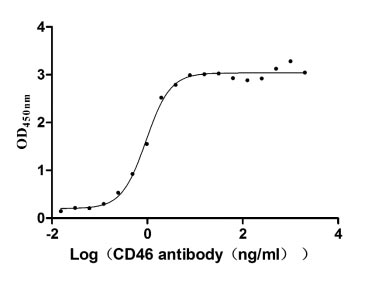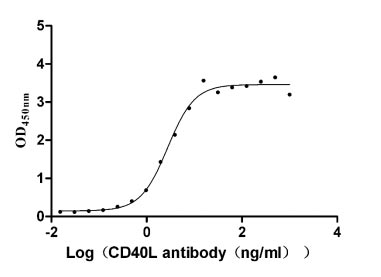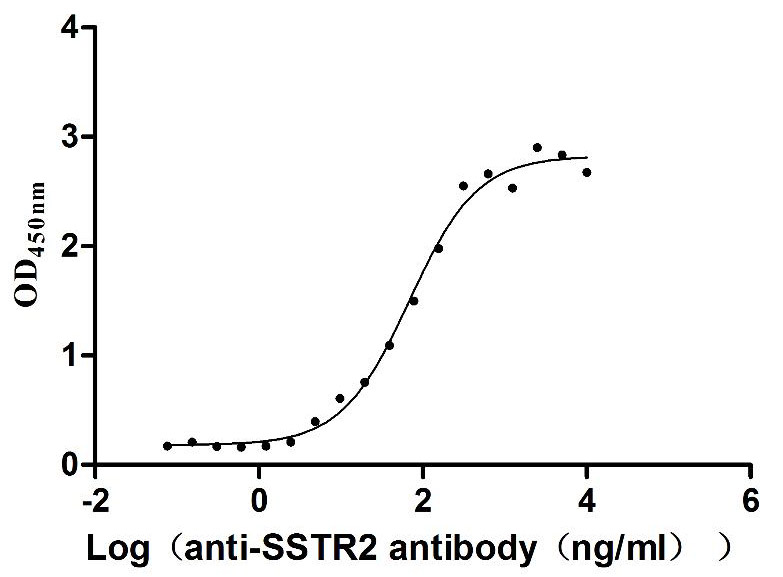Recombinant Human Phospholemman (FXYD1), partial
-
中文名稱:人FXYD1重組蛋白
-
貨號:CSB-YP009089HU1
-
規(guī)格:
-
來源:Yeast
-
其他:
-
中文名稱:人FXYD1重組蛋白
-
貨號:CSB-EP009089HU1
-
規(guī)格:
-
來源:E.coli
-
其他:
-
中文名稱:人FXYD1重組蛋白
-
貨號:CSB-EP009089HU1-B
-
規(guī)格:
-
來源:E.coli
-
共軛:Avi-tag Biotinylated
E. coli biotin ligase (BirA) is highly specific in covalently attaching biotin to the 15 amino acid AviTag peptide. This recombinant protein was biotinylated in vivo by AviTag-BirA technology, which method is BriA catalyzes amide linkage between the biotin and the specific lysine of the AviTag.
-
其他:
-
中文名稱:人FXYD1重組蛋白
-
貨號:CSB-BP009089HU1
-
規(guī)格:
-
來源:Baculovirus
-
其他:
-
中文名稱:人FXYD1重組蛋白
-
貨號:CSB-MP009089HU1
-
規(guī)格:
-
來源:Mammalian cell
-
其他:
產(chǎn)品詳情
-
純度:>85% (SDS-PAGE)
-
基因名:
-
Uniprot No.:
-
別名:FXYD1; PLM; Phospholemman; FXYD domain-containing ion transport regulator 1; Sodium/potassium-transporting ATPase subunit FXYD1
-
種屬:Homo sapiens (Human)
-
蛋白長度:Partial
-
蛋白標簽:Tag?type?will?be?determined?during?the?manufacturing?process.
The tag type will be determined during production process. If you have specified tag type, please tell us and we will develop the specified tag preferentially. -
產(chǎn)品提供形式:Lyophilized powder
Note: We will preferentially ship the format that we have in stock, however, if you have any special requirement for the format, please remark your requirement when placing the order, we will prepare according to your demand. -
復溶:We recommend that this vial be briefly centrifuged prior to opening to bring the contents to the bottom. Please reconstitute protein in deionized sterile water to a concentration of 0.1-1.0 mg/mL.We recommend to add 5-50% of glycerol (final concentration) and aliquot for long-term storage at -20℃/-80℃. Our default final concentration of glycerol is 50%. Customers could use it as reference.
-
儲存條件:Store at -20°C/-80°C upon receipt, aliquoting is necessary for mutiple use. Avoid repeated freeze-thaw cycles.
-
保質(zhì)期:The shelf life is related to many factors, storage state, buffer ingredients, storage temperature and the stability of the protein itself.
Generally, the shelf life of liquid form is 6 months at -20°C/-80°C. The shelf life of lyophilized form is 12 months at -20°C/-80°C. -
貨期:Delivery time may differ from different purchasing way or location, please kindly consult your local distributors for specific delivery time.Note: All of our proteins are default shipped with normal blue ice packs, if you request to ship with dry ice, please communicate with us in advance and extra fees will be charged.
-
注意事項:Repeated freezing and thawing is not recommended. Store working aliquots at 4°C for up to one week.
-
Datasheet :Please contact us to get it.
相關(guān)產(chǎn)品
靶點詳情
-
功能:Associates with and regulates the activity of the sodium/potassium-transporting ATPase (NKA) which transports Na(+) out of the cell and K(+) into the cell. Inhibits NKA activity in its unphosphorylated state and stimulates activity when phosphorylated. Reduces glutathionylation of the NKA beta-1 subunit ATP1B1, thus reversing glutathionylation-mediated inhibition of ATP1B1. Contributes to female sexual development by maintaining the excitability of neurons which secrete gonadotropin-releasing hormone.
-
基因功能參考文獻:
- Study demonstrated that the expression of FXYD1, FXYD3 and FXYD5 is elevated in the lungs of Acute respiratory distress syndrome patients PMID: 26410457
- a period of high-intensity training with reduced training volume increases expression and phosphorylation levels of FXYD1, which may affect Na(+)/K(+) pump activity and muscle K(+) homeostasis during intense exercise. PMID: 26791827
- Stopped-flow experiments using the dye RH421 show that FXYD1 slows the conformational transition E2(2K)ATP --> E1(3Na)ATP but does not affect 3NaE1P --> E2P3Na. PMID: 26429909
- the evolutionary conservation of G-quadruplex forming sequences with the confirmation of G-quadruplex formation in vitro by two FXYD1 homologues PMID: 25051342
- Phospholemman is the target of a variety of post-translational modifications and these can dynamically alter the activity of the Na pump. [Review] PMID: 23672825
- PLM regulates important ion transporters in the heart and offers a tempting target for development of drugs to treat heart failure. PMID: 23224879
- Intracellular trafficking of FXYD1 (phospholemman) and FXYD7 proteins in Xenopus oocytes and mammalian cells. PMID: 22535957
- the severity of the spinal cord lesion is an important factor controlling the expression of Na(+)-K(+)-ATPase and its regulatory protein PLM PMID: 22275761
- in left ventricular myocardium from patients with heart failure, PLM Ser-68 phosphorylation was approximately 50% lower than in nonfailing controls PMID: 21849407
- Exercise induces FXYD1 phosphorylation at multiple sites in human muscle; in mice, contraction-induced changes in FXYD1 phosphorylation are fiber-type specific and dependent on protein kinase Calpha activity. PMID: 21957166
- FXYD1 raises the affinity of the human alpha1beta1 isoform of Na,K-ATPase for Na ions PMID: 21449573
- Results suggest that the PLM cytoplasmic domain populates NKA-associated and membrane-associated states in dynamic equilibrium and that phosphorylation may alter the position of the equilibrium. PMID: 21130070
- phosphorylation of PLM increases its oligomerization into tetramers, decreases its binding to NKA, and alters the structures of both the tetramer and NKA regulatory complex. PMID: 21220422
- PLM phosphorylation at either Ser63 or Ser68 is both necessary and sufficient for completely relieving the PLM-induced NKA inhibition. PMID: 20861470
- Data suggest that phospholemman plays an important role in fine tuning the gating kinetics of cardiac calcium channels and likely plays an important role in shaping the cardiac action potential and regulating Ca(2+) dynamics in the heart. PMID: 20720179
- Phospholemman modulates the gating of cardiac L-type calcium channels PMID: 20371314
- Study reveals, in various human tissues, the specific expression of FXYD1, which may associate with Na, K-ATPase in selected cell types and modulate its catalytic properties. PMID: 19879113
- molecular cloning, protein expression, sequencing and NMR structure determination PMID: 12535606
- show that the helical regions and connecting segments of FXYD1, FXYD3, and FXYD4 determined in micelles by NMR spectroscopy coincide with the positions of intron-exon junctions in the genes PMID: 16288923
- PLM interacts with the intracellular loop of NCX1, most likely at residues 218-358 PMID: 16921169
- study reports that FXYD1 is elevated in frontal cortex neurons of Rett syndrome patients and Mecp2-null mice; FXYD1 is identified as a MeCP2 target gene whose de-repression may directly contribute to RTT neuronal pathogenesis PMID: 17309881
- the structure of FXYD1 suggests a mechanism whereby the phosphorylation of conserved Ser residues, by protein kinases A and C, could induce a conformational change in the cytoplasmic domain, to modulate its interaction with the Na,K-ATPase, alpha subunit PMID: 18000745
- reconstituted FXYD1 protects both alpha1beta1 and alpha2beta1 very strongly against thermal inactivation PMID: 18052210
- Data show that PLM associates with and modulates both NKA-alpha1 and NKA-alpha2 in a comparable but not identical manner. PMID: 19638348
顯示更多
收起更多
-
亞細胞定位:Cell membrane, sarcolemma; Single-pass type I membrane protein. Apical cell membrane; Single-pass type I membrane protein. Membrane, caveola. Cell membrane, sarcolemma, T-tubule.
-
蛋白家族:FXYD family
-
組織特異性:Highest expression in skeletal muscle and heart. Moderate levels in brain, placenta, lung, liver, pancreas, uterus, bladder, prostate, small intestine and colon with mucosal lining. Very low levels in kidney, colon and small intestine without mucosa, pros
-
數(shù)據(jù)庫鏈接:
Most popular with customers
-
Recombinant Human Membrane cofactor protein (CD46), partial (Active)
Express system: Mammalian cell
Species: Homo sapiens (Human)
-
Recombinant Human CD40 ligand (CD40LG), partial (Active)
Express system: Mammalian cell
Species: Homo sapiens (Human)
-
Recombinant Severe acute respiratory syndrome coronavirus 2 Spike glycoprotein (S), partial (Active)
Express system: Mammalian cell
Species: Severe acute respiratory syndrome coronavirus 2 (2019-nCoV) (SARS-CoV-2)
-
Recombinant Human SARS coronavirus Spike glycoprotein (S), partial (Active)
Express system: Mammalian cell
Species: Human SARS coronavirus (SARS-CoV) (Severe acute respiratory syndrome coronavirus)
-
Recombinant Human Glypican-3 (GPC3) (G537R), partial (Active)
Express system: Mammalian cell
Species: Homo sapiens (Human)
-
Recombinant Mouse Semaphorin-4D (Sema4d), partial (Active)
Express system: Mammalian cell
Species: Mus musculus (Mouse)
-
Recombinant Human Somatostatin receptor type 2 (SSTR2)-VLPs (Active)
Express system: Mammalian cell
Species: Homo sapiens (Human)
-
Recombinant Human Claudin-6 (CLDN6)-VLPs, Fluorescent (Active)
Express system: Mammalian cell
Species: Homo sapiens (Human)






-AC1.jpg)


f4-AC1.jpg)










